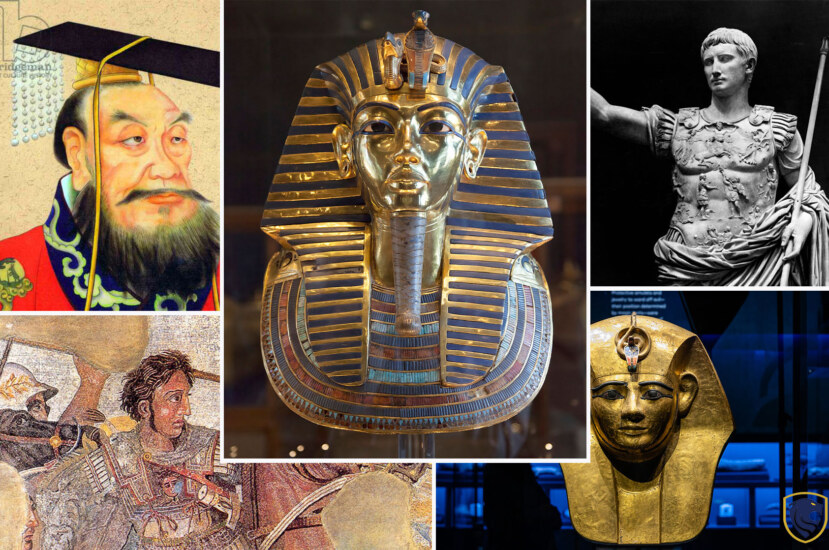We can find thousands of kings in history books. We all love to read about kings and their luxurious royal lives. But being a king doesn’t only mean those things. It is taking control of an entire kingdom. Throughout ancient history, we can find some kings that have been standing out among other rulers.
Alexander III of Macedon
Because of his imperial legacy, Alexander III of Macedon is frequently referred to as Alexander the Great. He ruled the ancient Greek nation of Macedon. At the age of 20, he has crowned the king of Greece in 336 BC. He conducted a protracted military war in Western Asia and Egypt for the majority of his reign. Also, he built one of the biggest empires in history by the age of 30, spanning from Greece to northwest India. He is regarded as one of history’s strongest and most accomplished military leaders because he was unbeatable in combat.

Alexander III of Macedon
Aristotle who was a great philosopher taught Alexander until he was 16 years old. He fought in the Balkans in 335 BC, not long after regaining the throne of Macedon. Moreover, he reasserted authority over Thrace and Illyria before heading to the city of Thebes, which was subsequently destroyed in combat. Afterward, he undertook the pan-Hellenic mission that his father had envisioned, taking charge of all Greeks in their invasion of Persia.
long series of battles
He attacked the Achaemenid Persian Empire in 334 BC, starting a 10-year-long series of battles. After conquering Asia Minor, Alexander defeated Achaemenid Persia in a string of crucial battles. Then, he captured Darius III and seized control of the whole Achaemenid Empire. The Macedonian Empire controlled a sizable area between the Adriatic Sea and the Indus River when Persia fell apart. In 326 BC, Alexander invaded India.

long series of battles
According to historians, that was an effort took to reach the “ends of the globe and the Great Outer Sea.” At the Battle of the Hydaspes, he decisively defeated Porus. He is an ancient Indian monarch who ruled over modern-day Punjab. The next set of planned military and commercial efforts, which would have started with a Greek invasion of Arabia, was left unfinished by Alexander’s death.
Qin Shi Huang
Theoretically, King Qin Shi Huang marked the beginning of the imperial era. Also, he was the one to mark the end of what is known as ancient Chinese history. He was the first emperor to unite China. Moreover, he was the philosopher behind various concepts that succeeding emperors would adopt.
During the “warring states period,” he ascended to the throne of one of the seven warring kingdoms. Then he used harsh military conquest to bring the other six regions under his power. Taking the title of Emperor of China, he eliminated feudalism, revised the administrative framework, and substituted officials for those appointed based on hereditary authorities. In addition, he started a protracted public works drive that included constructing the Great Wall’s initial version and a canal that connected the Yangtze and Pearl Rivers.

Qin Shi Huang
Along with constructing large roads, changing the currency, and redistributing land to the people, his government thrived. There was a negative side to Qin Shi Huang. He created a poor impression on people by burning the whole imperial library’s collection of writings, which was against the legalistic worldview that his administration upheld. As a result, under his leadership, the blooming of ideas that characterized the philosophy of the Warring States came to an end. Also, the ideas he wanted to stifle, such as Confucianism, quietly disappeared.
King Qin Shi Huang hunted for immortality potions as he reached the end of his life. Several of these elixirs were said to contain mercury, which may have accelerated his demise.
Caesar Augustus
Caesar Augustus is considered as one f the most powerful kings that have ever lived. He is also known as Octavian. Caesar Augustus marked the initiation of the Roman dynasty.
While completing the invasion of Hispania and annexing Egypt, Dalmatia, Pannonia, Noricum, and Raetia he expanded his empire’s borders to Africa. Augustus suffered a serious defeat in Germany. Outside the borders, he protected the empire with a buffer zone of client nations and reached a diplomatic agreement with the Parthian Empire.

Caesar Augustus
Under his reign, he overhauled Rome’s taxation system and erected official courier networks. In addition, he established networks of roads, a standing army, the Praetorian Guard, and official police and fire protection for Rome. Also, he extensively renovated the city. At the age of 75. His wife Livia poisoned him, according to persistent tales.
Tutankhamen
Tutankhamun’s reputation as a strong leader was earned via the accomplishments he completed throughout his nine-year reign. Even though he was just about eighteen or nineteen when he passed away he is still a royal icon in Egyptian history.

Tutankhamen
After his father’s encouragement of the worship of just the Sun God Aten and ban on the worship of any other deities, King Tut’s primary accomplishment was the restoration of the old Egyptian polytheistic religion following his ascension. Tutankhamun became a well-respected leader as a result of his choice to abandon this new religion, which was extremely unpopular in Egypt.
Ramses II
Ramses is considered to be one of the greatest kings that have ever used to rule Egypt. All of us consider Egypt to be a country with great kings. He was known as Ozymandias to the Greeks.
This powerful king himself was naturally mummified.
Just like previous notable Egyptian kings, Ramses oversaw several enormous construction initiatives Further, his undertakings were on a scale not seen since the construction of the Pyramids, unlike the majority of his predecessors.
He created Pi-Ramesses’ new capital, a magnificent metropolis and military outpost from which he managed to keep an eye on his Canaanite lands. Around this period, several enormous temple constructions took place. One of the major constructions was the well-known Abu Simbel temples. This was dedicated and featured enormous pictures, of himself.

Ramses II
Ramses was a well-respected general who personally supervised his army in Libya, Nubia, and Canaan. Moreover, the first peace agreement in human history was a result of his battle with the Hittites.
Ramses was able to make Egypt one of the two major civilizations to survive failure and devastation at the hands of the enigmatic “Sea Peoples” by defeating them in war. That was a time when other Mediterranean civilizations failed. Without his guidance, Egypt would have gone through the same dark era as its neighbors, leaving the globe in worse shape.
Abu’l-Fath Jalal-ud-din Muhammad Akbar
Al-Fath Jalal-Din Abu’l-Fath Muhammad Akbar is one of the most powerful Indian kings that have ever lived. He is also known as Akbar the Great. He lived from October 15, 1542, until October 27, 1605. King Akbar was a Persian emperor. The third Mughal emperor, known as Akbar Azam and also as Akbar I ruled from 1556 until 1605.

Abu’l-Fath Jalal-ud-din Muhammad Akbar
Akbar used to be a brilliant general with a strong personality. Moreover, he quickly expanded the Mughal Empire. His kingdom included most of the Indian subcontinent. Akbar implemented a centralized administrative structure across his empire. Also, he pursued a policy of appeasing conquered kings to unify the huge Mughal realm.




